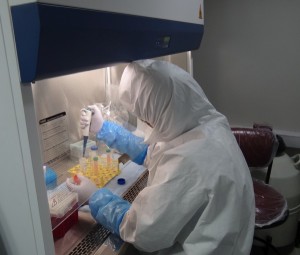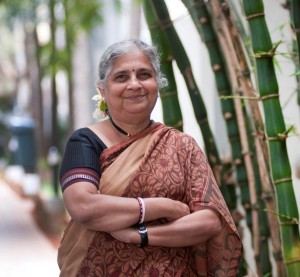major-benefactors
Infosys Foundation Funding for Infectious Disease Research at IISc
Sudhi Oberoi*

Courtesy: CIDR
The Infosys Foundation has announced a financial grant to the Centre for Infectious Disease Research (CIDR) at IISc to help broaden its research and also provide additional infrastructural support to the Centre.
Infectious diseases like tuberculosis (TB), malaria, HIV/AIDS, hepatitis and more recently SARS, Ebola and Zika virus diseases are posing a threat to human health around the world. With human-induced changes to the environment and increased globalization, pathogens have become more likely to switch hosts and spread across traditional geographic barriers, causing not just more frequent disease outbreaks, but also epidemics. While some infectious diseases have been well researched and can be cured or at least prevented, many others, particularly tropical diseases, have received far less attention. A major goal of CIDR, set up in 2013, is to help plug this gap and address questions in infectious disease research that are more relevant to countries like India.
Currently, CIDR consists of a central lab, a state-of-the-art bio containment space known as the Biosafety Level-3 (BSL-3) facility and office space for its researchers. In the past few months, the Centre has been looking to expand the scope of its research and improve its infrastructure, a point that was highlighted by G Padmanabhan, a former Director of IISc and currently an Emeritus Professor at the Department of Biochemistry, during a session of the Global Alumni Meet of IISc in June 2015.
Speaking to CONNECT, Dipankar Nandi, a professor at the Department of Biochemistry and Convenor of the committee that runs CIDR, said that Sudha Murty (Chairperson, Infosys Foundation, and an alumnus of IISc), who was chairing this session, immediately offered to help CIDR in its plans for expansion.

Sudha Murty, Chairperson, Infosys Foundation India (Courtesy: INFOSYS FOUNDATION)
Revealing why she was motivated to help infectious disease research, Murty, in an interview to CONNECT, said,“Infectious diseases are increasing day by day, challenging health of our country.” To address this challenge, she stressed upon the importance of advancing fundamental research in the area of infectious diseases and also developing new drugs and diagnostics.
The support from Infosys Foundation, which will be spread over five years, will help in building an annexe to the Centre resulting in three laboratories and office space.
In addition, a small animal BSL-3 facility for research will be built. Finally, the research team at CIDR will be increased by recruiting two Infosys Fellows who will perform independent research. Some of the money will also be used to pursue another important goal of the Centre: translational research. “One big idea we have is that this would not just allow building infrastructure, but will also open avenues for translational research in infectious diseases,” Nandi added.
The Centre, which is already working with researchers from all over the Institute to ensure an interdisciplinary approach to studying infectious diseases, also plans to organise seminars to increase public awareness on the subject.
*Sudhi Oberoi is a Project Trainee at the Archives and Publications Cell (APC)
IISc alumnus, Dr. Desiraju Rajagopal Rao and Dr. Vijaya Rao
IISc alumnus, Dr. Desiraju Rajagopal Rao, along with Dr. Vijaya Rao, who live in Mysore, have made a generous contribution to create “Dr. Vijaya and Dr. Rajagopal Rao Biomedical Research Laboratory” in the Centre for BioSystems Science and Engineering (BSSE ), IISc. Their contribution will support research in this area in perpetuity. Dr. Rajagopal Rao had enrolled in the Associateship Programme in Biochemistry in the mid 1950s. Dr. Rajagopal Rao conducted basic research in food biochemistry at the Central Food Technology Research Institute, Mysore, and retired as its acting Director. Dr. Vijaya Rao served with distinction as a microbiologist at the Defence Food Research Laboratory, also located in Mysore, and retired as Deputy Director. This distinguished scientist couple is passionate about science, and biomedical research in particular. Their munificence is sincerely appreciated by IISc.
—
Rural Electrification Corporation Limited
Rural Electrification Corporation Limited (REC), a Govt. of India Navratna Enterprise, has extended financial assistance under its CSR initiative to establish 279 KWp photovoltaic solar panels on 3 building rooftops and 2200 LED lights at various locations on the IISc Bangalore campus. The objective of this project is to reduce the campus carbon footprint and dependence on non-renewable energy sources. The Memorandum of Agreement (MoA) promoting this partnership was signed on 31^st October 2016 by Shri P. S. Hariharan, Zonal Manager, Southern Zone, REC, and Shri V. Rajarajan, Registrar of IISc, in the presence of Prof. Anurag Kumar, Director of IISc, and other senior officials of REC and IISc.
—
Third description on HAL will come from Ranjini.





